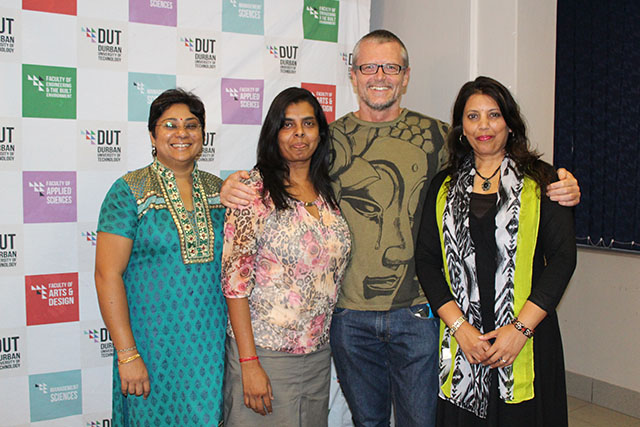Focusing on assessment which has a strong influence on student learning was one of the aspects discussed at the two-day Assessment Policy Workshop held at the DUT Hotel School Conference Centre, Ritson Campus.
The event, which was organised by DUT’s Centre for Excellence in Learning and Teaching (CELT), engaged the expertise of Professor Wayne Hugo, a Professor of Education at UKZN, to facilitate the workshop.
Professor Wayne Hugo has written numerous articles and books on the subject. His four recent and about to be published books build up a systematic vision of how education works.
CELT’s goal is to contribute to the enhancement of the quality of learning, teaching and assessment across all academic programmes offered by DUT.
The Assessment Policy Workshop examined DUT’s practice in terms of its alignment to the Assessment Policy and the theoretical underpinnings. It also explored strategies to enhance learning.
Prof Hugo spoke in detail about the strategies and techniques and what lecturers can do to make learning more effective for students. He also emphasised on the single-loop learning (problem-solving) which is the most common type of learning as well as improving the system of learning as it exists. “If, through feedback, you can show your student how to constructively move forward, they will surprise you by actually taking your advice,” he said.
CELT’s Shoba Rathilal, Academic Development Practitioner, said that workshop focused on the principles and philosophies underlying DUT’s assessment policy. “The assessment policy states that it seeks to influence and shape practices by foregrounding assessment strategies that require students to think critically about academic issues and problems and to explore a variety of approaches to solving problems in discipline and profession specific context. As the university takes on the identity of a student-centred institution, learning, teaching and assessment practices have to be questioned and changed wherever needed as institutional philosophies change,” said Rathilal. She added that this type of workshop explored the experiences and theories of ‘institutional change and assessment’ using the assessment policy as a point of departure.
Almost all participants found the workshop extremely beneficial. They described the workshop as “interesting and well structured”. The workshop forced staff to think critically about their assessment practices and their underlying assumptions and feelings about learning, teaching and assessment in a “student centred” University.
Participants expressed joy at the opportunity to engage with “student centeredness” and how it is being experienced and understood in the learning and teaching spaces at DUT. During the discussions, it was highlighted that there are varied interpretations of student centeredness and the greatest concern was around what staff perceived students expected out of a student centred learning experience.
Rathilal also said that staff were impressed with Prof Hugo and found him to be extremely knowledgeable and insightful. “They appreciated his facilitation style and enjoyed the interactive nature of the workshop and he was able to provide a theoretical lens to the concepts within the workshop and the experiences of staff,” she said.
The general consensus from staff, after the two-day workshop, was that it had impacted positively on them and that they would look for opportunities to move away from the typical ways of engaging in ‘presentism’ (short term focus), individualism (lecturing alone rather than with others) and conservatism (doing things mostly the same way, making small scale changes) in terms of learning, teaching and assessment.
– Waheeda Peters
Pictured: Shubnam Rambharos, Shoba Rathilal, Prof Wayne Hugo (UKZN) and Nalini Chitanand, at the Assessment Policy Workshop.


